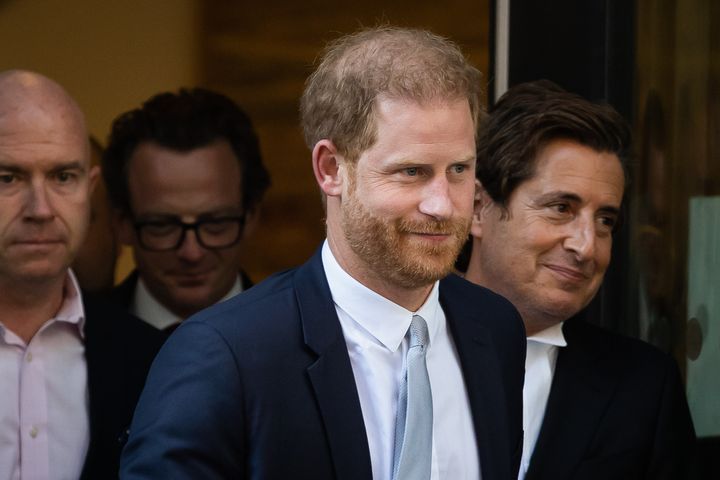LONDON (AP) — A lawyer for Prince Harry asked a judge Monday to order the publisher of the Daily Mirror tabloid to pay nearly 2 million pounds ($2.5 million) for a portion of the legal fees spent to prove that Mirror Group Newspapers invaded his privacy by hacking his phone and using unlawful means to dig up scoops on him.
The Duke of Sussex was awarded 140,000 pounds ($178,000) in damages last month after the judge found that phone hacking was “widespread and habitual” at Mirror newspapers and executives at the papers covered it up.
The award was only a fraction of the sum he sought, but represented a major victory in his legal crusade against the British media. It is only one of several cases he has pending against tabloid publishers as he bucked his family’s longstanding aversion to litigation and in June became the first senior member of the royal family to testify in court in over a century.
Harry, 39, the alienated younger son of King Charles III, is likely to return to court in the coming year in similar trials against the publishers of The Sun and Daily Mail over allegations of unlawful snooping. He recently dropped a libel case against the Mail publisher after an unfavorable pretrial ruling.
SOPA Images via Getty Images
The hearing Monday was over legal fees for a trial that involved Harry as one of four claimants, including two members of Britain’s longest-running TV soap opera, “Coronation Street,” who accused Mirror of hacking their phones and hiring private investigators to unlawfully gather information about their lives.
The judge found the privacy of all four claimants had been violated but he tossed out cases brought by actor Nikki Sanderson and Fiona Wightman, the former wife of comedian Paul Whitehouse, because they were filed too late. He awarded actor Michael Turner 31,000 pounds ($39,000).
Attorney David Sherborne argued that his case was “overwhelmingly successful” and his clients should be reimbursed legal fees because Mirror “advanced a fundamentally dishonest case.”
Attorney Roger Mallalieu for Mirror Group argued that it should only have to pay legal fees for the portions of the claims it lost. It said Sanderson and Wightman should pay MGN’s costs for losing their cases. He argued that Turner should only receive costs up to the point that Mirror offered a settlement that would have exceeded what he was awarded at trial and he should pay their costs after that point.
Justice Timothy Fancourt indicated he would rule at a later date.
The fees being sought were mainly for the broader claim brought against Mirror by all the claimants and not for the legal costs of preparing for and presenting Harry’s specific cases because his claims have not been fully resolved.
Fancourt found that Mirror used unlawful information gathering in 15 of the 33 newspaper articles about Harry that were examined at trial. Those articles were selected as a representative sample from among nearly 150 articles that he said invaded his privacy.
Sherborne asked that a trial be scheduled to take up the remaining 115 articles. Mirror indicated in court papers that it has made a settlement offer to Harry that could not be disclosed.
Once those claims are resolved, Harry will be able to seek additional lawyers’ fees.
Phone hacking by British newspapers dates back more than two decades to a time when unethical journalists used an unsophisticated method of phoning the numbers of royals, celebrities, politicians and sports stars and, when prompted to leave a message, punched in default passcodes to eavesdrop on voicemails.
The practice erupted into a full-blown scandal in 2011 when Rupert Murdoch’s News of the World was revealed to have intercepted messages of a murdered girl, relatives of deceased British soldiers and victims of a bombing. Murdoch closed the paper.
Newspapers were later found to have used more intrusive means such as phone tapping, home bugging and obtaining flight information and medical records.
Mirror Group Newspapers said it has paid more than 100 million pounds ($128 million) in other phone hacking lawsuits over the years, but denied wrongdoing in Harry’s case. It said it used legitimate reporting methods to get information on the prince.

